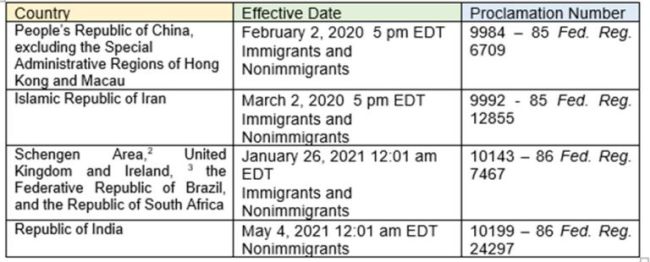According to various news reports, a White House official stated that foreign travelers subject to the various travel bans will be able to enter the U.S. as of November 8 without obtaining a National Interest Exception (NIE) due to their presence in restricted countries in the fourteen days before planned travel to the U.S., if fully vaccinated against COVID-19. This travel will be allowed with proof of vaccination (full) and a negative COVID-19 test within three days of boarding a flight to the U.S. In addition, fully vaccinated travelers will be able to enter the U.S. via the land border for non-essential reasons based on the October 12 announcement of Secretary of Homeland Security Alejandro N. Mayorkas in early November as well.
On September 20, Jeffrey Zients, the Biden administration's COVID-19 response coordinator, had previously indicated that the government would end the travel bans from the affected 33 countries in November for travelers with proof of vaccination and negative COVID-19 test. The Title 19 based restrictions at the land borders between in the U.S. and Mexico and Canada have been in effect since March 2020, while the first travel bans for air travel were imposed in February 2020. The last extension of land border essential travel restrictions was published in the Federal Register on September 22, 2021 and remains in effect through October 21, 2021 at 11:59 PM Eastern Daylight Time (EDT).
What countries were subject to the travel bans?
Below is a chart of the various travel ban proclamations that currently affect foreign nationals present in the listed countries, subject to certain exemptions:

What COVID-19 vaccinations will be acceptable for foreign travelers to the U.S?
On October 11, a spokesperson for the Centers for Disease Control and Prevention (CDC) confirmed that only COVID-19 vaccines approved/authorized by the U.S. Food and Drug Administration (FDA) OR those listed for emergency use by the World Health Organization (WHO) will be acceptable. At this time, those acceptable vaccines for air travelers are:
- FDA Authorized/Approved: Moderna, Johnson & Johnson and Pfizer-BioNTech.
- WHO Approved: Moderna, Johnson & Johnson, Pfizer-BioNTech, Oxford-AstraZeneca/Covishield, Sinopharm, and Sinovac.
As to acceptable COVID-19 vaccinations for land border foreign travelers, it is expected the list will be the same as for international air travel.
The CDC will require airlines to collect comprehensive contact information for every passenger coming to the U.S. and to provide that information promptly to CDC upon request. The CDC will contact travelers who have been exposed to COVID-19 variants or other pathogens
What proof of vaccination will be required?
While the U.S. has not announced what will constitute acceptable proof of vaccination, it may adopt requirements similar to Canada, which requires the following to qualify as a "fully vaccinated traveler":
- Have received the full series of an accepted COVID-19 vaccine or a full series of a combination of accepted vaccines;
- Have received your last dose at least 14 full days prior to the day you enter Canada; Example: if your last dose was anytime on Thursday July 1, then Friday July 16 would be the first day that you meet the 14 day condition;
- Upload your proof of vaccination in ArriveCAN;
- Have no signs or symptoms of COVID-19; and
- Meet all other entry requirements (e.g., pre-entry test result).
Another country that may offer insight for the future process to be used in the U.S. is the United Kingdom (U.K.). The U.K. government website provides an extensive list by country as to acceptable proof of being fully vaccinated against COVID-19. Visitors from the U.S., for example, must provide a CDC card showing completion of a full course of an FDA-approved vaccine plus proof of U.S. residence. In addition before travel to England as fully vaccinated against COVID-19, foreign travelers must book and pay for a COVID-19 test to be taken before the end of their second day in England and complete a passenger locator form in the 48 hours before arrival in England. Please also refer to the European Union Vaccine Passport requirements.
As another indicator of potential requirements for proof of full vaccination, on October 1, 2021 COVID-19 vaccinations were required for applicants for permanent residence in the U.S. Immigrant visa applicants in the U.S. and abroad at U.S. consular posts must complete the COVID-19 vaccine series. The following examples of vaccination timelines were provided:
Acceptable vaccination documentation must come from a vaccination record, either an official vaccination record or a copy of a medical chart with entries made by a physician or other appropriate medical personnel. If the COVID-19 formulation is a two-dose series, both doses must be documented. Only records of vaccine doses that include the dates of receipt (month, day, and year) are acceptable. The name or manufacturer and lot number should also be included, if available. The document must not appear to have been altered, and dates of vaccinations should seem reasonable. Self-reported vaccine doses without written documentation are not acceptable. In addition, the applicant is required to receive the vaccine series regardless of evidence of immunity or prior COVID-19 infection.
Are there any exceptions for proof of full vaccination from foreign travelers?
The initial announcement from the Biden administration indicated that exceptions will be "very narrow." The examples given were for children, COVID-19 clinical trial participants, and humanitarian grounds for those traveling for an important reason who lack access to vaccination timely.
It is possible that the U.S. government will adopt exceptions from COVID-19 vaccination requirements similar to those that have been applied to U.S. immigrant visa applicants as of October 1. For those individuals, blanket waivers of COVID-19 vaccinations are provided for the following circumstances:
- Not age-appropriate. Applicants who are younger than the lowest age limit (less than 12 years of age at present) for the specific formulations in use in their jurisdiction;
- Applicants with a documented contraindication or precaution to the administration of the COVID-19 vaccine formulation available; and
- Not routinely available. If no COVID-19 vaccine is routinely available in the state where the civil surgeon practices, or if the vaccine is available, but due to limited supply, it would cause significant delay to receive the vaccination.
The CDC instructions also addressed examples of consequences when an immigrant visa applicant does not complete a COVID-19 vaccine requirement:
- Religious or moral convictions. Applicants may request a vaccination waiver based on religious or moral convictions by submitting a waiver request to U.S. Citizenship and Immigration Services (USCIS). USCIS will determine if this type of waiver is granted, not the civil surgeon or CDC.
- If an applicant refuses to receive the COVID-19 vaccination, the examining physician will document that the vaccine requirements are not complete and that the applicant refuses vaccination. Such applicants are inadmissible to the U.S., and therefore will not be eligible for a green card/immigrant visa.
We will have to wait and see if a similar approach as to proof of vaccination is used for air travel by foreign nationals previously subject to the various travel bans. Certainly, the additional review process will require more advance planning by foreign travelers to the U.S.
What about land border travel and the essential worker restrictions?
First, we should expect that there will be another Federal Register notice extending the current essential worker restriction through... perhaps November 8. Based on the October 12 statement by DHS Secretary Mayorkas, the essential worker restrictions will be lifted in two phases.
- Phase One – Probably around November 8, foreign travelers from Mexico and Canada who are fully vaccinated for COVID-19 will be allowed to enter the U.S. for NON-ESSENTIAL PURPOSES at land and ferry Ports of Entry (POEs). Thus, for border cities in the U.S, they will hope to have some renewal of international visits to help the border economy.
- Phase Two – Beginning in early January of 2022, DHS will require that ALL inbound foreign travelers to the U.S. crossing via land or ferry POEs, whether for essential or non-essential reasons, be "fully vaccinated" for COVID-19 and provide the required proof of vaccination.
For those not fully vaccinated against COVID-19, they will not be allowed to travel to the U.S. for non-essential purposes from Canada or Mexico to the U.S. via land or ferry POEs. (note again the early January 2022 proposed date) As to acceptable documentation of full vaccination, at present, we can refer to the requirements imposed on immigrant visa applicants noted as well as the process used for admission of the fully vaccinated to Canada, England, and the European Union for insight.
The content of this article is intended to provide a general guide to the subject matter. Specialist advice should be sought about your specific circumstances.
